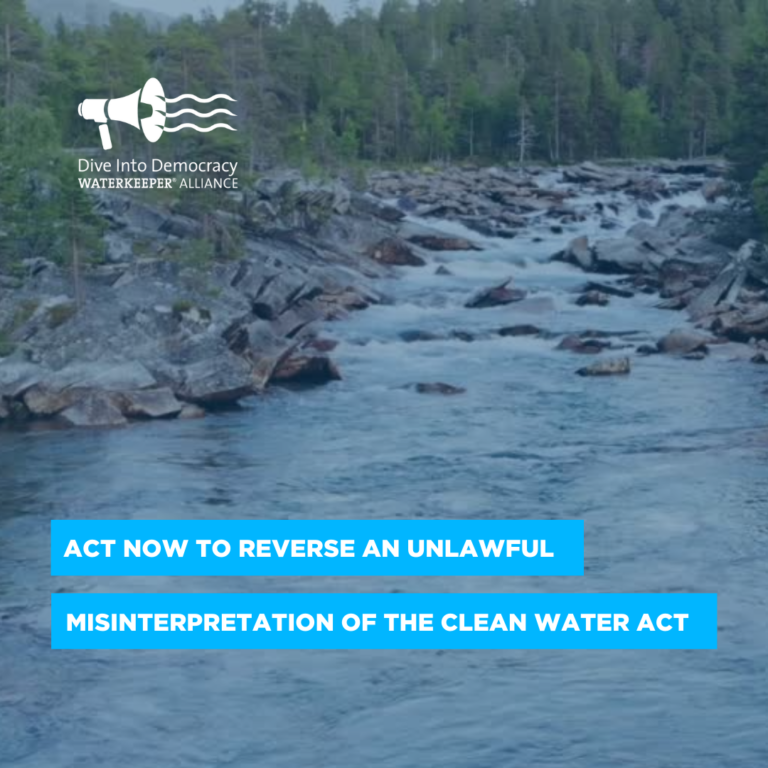We Must Urgently Restore Clean Water Protections
By: Thomas Hynes

In 2020, the Trump administration issued an unprecedented new regulation that dramatically eliminated federal Clean Water Act protections for rivers, streams, lakes, wetlands, and other waters across the country, in what has come to be known as the 2020 Dirty Water Rule. This unscientific, illegal, and reckless regulation harms the nation’s waters, and the people, communities, businesses, fish, and wildlife that depend on clean water.
The U.S. Environmental Protection Agency (EPA) and U.S. Army Corps of Engineers (Corps) recently announced their intention to revise this regulation as the 2020 Dirty Water Rule after determining that it is causing “significant environmental damage” across the country.
However, because the agencies intended to leave the 2020 Dirty Water Rule in place during their revision process, the severe damage to our nation’s waters will continue indefinitely during the agencies’ rulemaking process, which can take years.
That’s why EPA and the Corps must immediately repeal the 2020 Dirty Water Rule. Join us in asking the agencies to urgently repeal this irresponsible regulation.
Our vast interconnected water resources and ecosystems, and the many endangered and threatened species, depend on clean water. If a waterbody is not included within the definition of “waters of the United States,” it can be dredged, filled, and polluted with impunity because the Clean Water Act’s most fundamental human health and environmental safeguard – the prohibition of unauthorized discharges – no longer applies.
The 2020 Dirty Water Rule redefined “waters of the United States” under the Clean Water Act and resulted in the most extreme diminishment of protections since the law’s passage nearly 50 years ago. It allows toxic chemicals, radioactive waste, sewage, and other pollutants to be dumped into our nation’s rivers, streams, lakes, and wetlands without any federal protections.
For example, a 2021 analysis found that, between June 22, 2020, and April 15, 2021, 76 percent of waters evaluated were no longer protected by the Clean Water Act, including 99.6 percent of streams in Arizona and 100 percent of streams in New Mexico. This analysis is consistent with destructive impacts identified in our evaluation of how the 2020 Dirty Water Rule would impact the watersheds of twelve Waterkeeper groups across the country, including the loss of clean water protection in, for example:
- 90 percent of rivers and streams in New Mexico, including most of the streams feeding the Rio Grande;
- Texas coastal prairie wetlands crucial to the health of Lower Galveston Bay;
- Ephemeral streams, reservoirs, ditches, and canals that feed into the primary drinking water supply for the Colorado cities of Boulder, Louisville, Lafayette, Erie, Superior, and Nederland;
- Wetlands, streams, and canals that flow into the Cape Fear River in North Carolina;
- Streams in the Rogue River Basin in Oregon that provide drinking water for the region, as well as habitat and spawning grounds for federal threatened salmon and steelhead;
- More than 40 percent of the streams that flow into and influence the water quality of San Francisco Bay in California, as well as provide spawning grounds for endangered Chinook salmon;
- All of the waters, including premiere trout streams and critical habitat for federally threatened bull trout, located within a 5,185 square mile area in the upper Snake River Basin of Idaho;
- An estimated 30,297 miles (85 percent) of the streams in the Upper Missouri River Basin of Montana that feed into and impact water quality premier fisheries, recreational waters, and drinking waters supplies; and
- Large numbers of rivers and streams in Missouri that briefly flow subsurface and then reemerge as surface waters impacting larger, important downstream waterways such as the Missouri and Meramec Rivers.
As the Western United States suffers through a continued and historic megadrought, it is especially reckless to leave a regulation that eliminates water protections in place indefinitely. This regulation must be revoked and broad protections for the nation’s waters must be urgently restored.
EPA and the Corps have now opened up a public comment opportunity and we need to let them know that clean water is of the utmost importance. Will you join us in urging the EPA and the Corps to immediately repeal this disastrous regulation that eliminated Clean Water Act protections for the nation’s waters?
We have already seen what effects unbridled pollution can have on our waterways, ecosystem, and public health. We must not go backwards. We cannot return to the age of rampant pollution and burning rivers.
Time is of the essence. Each day this destruction regulation stays on the books is another day polluters can avoid implementing pollution controls, harming the health of our communities, and destroying our shared waterways. A future of clean water demands we act today!
Your supportive action can help encourage the EPA and the Corps to reverse the 2020 Dirty Water Rule. Leave a comment above to urge an immediate repeal of this dangerous regulation and the full restoration of Clean Water Act Protections for the nation’s waters. You can also sign up for one of the stakeholder meetings listed here to make your voice heard directly with the agencies.